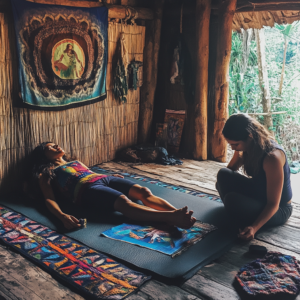3 years of couples therapy in one medicine journey.
Relationships are hard work. It’s not always unicorns and rainbows and staying with your partner through the good and bad, isn’t always easy. When you feel like you and your partner aren’t connecting it can be challenging for the relationship. Communication and coming from a place of openness and honesty are key. Sometimes however we need a little help and that’s ok.
Our experience with MDMA therapy.
A few years ago my relationship needed help. My boyfriend and I had been fighting on a regular basis and there were some deep hurts on both sides of our relationship coin. At one point we even thought about ending things. We loved each other yet couldn’t seem to communicate past the hurt barrier and ended up being misunderstood. Instead of giving up on each other, we decided to try something different. What we tried eventually saved our relationship. It not only saved it but made it stronger than it has ever been.
Before I dive into what eventually became the cornerstone of a new dynamic between us, I want to share a few thoughts on effective communication and how this can be crucial for maintaining a healthy relationship. We learned about Active Listening, using ‘I” statements and the importance of regular check-ins with each other.
Active Listening Relationship Technique:
- Active listening involves giving your full attention to your partner, and making a conscious effort to understand their perspective without interrupting or formulating your response while they speak. Repeat back what you’ve heard to ensure you’ve understood correctly. This method fosters a sense of validation and understanding, creating a space for open and honest communication.
Use of “I” Statements:
- Framing statements with “I” rather than “you” can promote better communication by expressing thoughts and feelings without assigning blame. For example, saying “I feel unheard when…” instead of “You never listen to me” encourages a more constructive dialogue. This method helps to avoid defensiveness and encourages the partner to empathize with the speaker’s emotions.
Regular Check-Ins:
- Establishing a routine for check-in with your significant other to discuss your feelings, concerns, and needs regularly can help keep the relationship channels open. This could be a weekly special dinner or date night out, or simply a designated time for open communication where you and your partner dedicate some ‘couple time’.
It’s important to note that effective communication involves not only expressing oneself but also actively listening to your partner’s perspective. Additionally, maintaining a respectful and non-judgmental tone contributes to a positive communication environment.
I learned all this from counselling, which was helpful. But did this save us? No. It was a step in our communicative development but our hurts needed something which focused on opening our hearts. While I wouldn’t not recommend counselling, there’s something else that catapulted us into the connection and healing we needed. With only one session we were able to let go of old hurts and truly listen to one another.
An empathogen. A substance that increases one’s ability to have empathy for another and increases feelings of acceptance and connectivity is what saved us.
The substance? MDMA (3,4-methylenedioxy-methamphetamine). Otherwise more popularly known as Molly or Ecstasy. A medicine that is currently being studied for its positive effects on couples therapy, PTSD and for helping heal trauma. It’s important to note that MDMA is not yet legal in Canada and I advise you to review the safety guidelines at the end of this article.
The first time I used MDMA was in Europe (where certain psychedelics were legal). I was a young 21-year-old and at a rave and my friend. We were offered some ‘E’ as it was called then and (being young and perhaps a little foolish) we took it. Fortunately for us, it ended up being safe and gave us some mild sensations of wanting to ‘give the world a hug’. I had never taken it again since. That is, until recently when I discovered that it could not only help heal my relationship, it could help make my Tinnitus disappear. (even if only for the duration of the medicine). Side note: there have been some inconclusive studies on the effects of MDMA and tinnitus. If you’re a sufferer, I highly recommend to some research. But I digress.
The fact that MDMA is currently still illegal in Canada and the US, astounds me. The ‘love drug’ got its name for a reason. It is one of the most heart-opening and beautiful medicines that I’ve tried. When used responsibly this medicine has so much potential to not only heal relationships but to heal our ever-increasingly broken world.
Precautions and Safety Tips for Using MDMA in Therapy.
How to use MDMA responsibly? Never use in conjunction with SSRIs, such as anti-depressants. I recommend being off them for at least 2 weeks as MDMA affects your serotonin levels. Be prepared for a potential post-session crash. Mind you, this happened to me only after my first experience. Remember, it’s essential to prioritize safety and adhere to legal and ethical guidelines.*
With that said, if you’re ready to try MDMA responsibly* as a couple, you’re probably wondering what it feels like. The trip itself can last up to six hours with the peak being anywhere around an hour and a half, to two hours in. Some people may feel some anxiety on the come up and if you do experience this, remember this is temporary and will fade once the full effect of the medicine begins. I recommend having some Gatorade on hand to keep hydrated, however, you don’t want to drink too much while on the medicine. You may start to feel very cold or very sweaty and this will also pass. You will get what is known as ‘raver’ jaw and for this, I recommend purchasing a baby soother. Yes, I wrote that correctly. I’ve personally found that biting on a soother can help alleviate any post-jaw pain and tension.
MDMA won’t necessarily cause an ego death like other alternative medicines and psychedelics. However, keep in mind that every medicine affects each person differently. In general, there is less fear involved. Rather, it will shift and enhance the way you relate to yourself and others through compassion, trust, and love. In other words, it’s heart-opening. I often say you cannot experience a negative emotion while on this medicine. (at least in my experience). You are present and fully present in the moment and yes, it does feel like you want to ‘give the world a hug’.
Embarking on this medicinal journey with my partner allowed us to delve into each other’s emotions without judgment. The shared experience created a unique space where we not only heard but also felt each other’s sentiments. The heightened sense of empathy created during this journey propelled us into a renewed connection. Communication flowed effortlessly, free from judgment or fear, fostering an open and profound exchange.
Set and setting are also extremely important. For preparation, I recommend playing some good music, something upbeat but not too intense. One of our personal favorites is Leftfield. Yes, we’re that old. Music can be amazing and your relationship to sound changes as it can reach deep inside of you. If you’re not a dancer you may feel the urge to dance. Follow your bliss and enjoy these moments of freedom. I also love having soft pillows and blankets near me as you may be very touch-sensitive. This is also a great opportunity to get cozy with your loved one. If you feel ready and comfortable with naked cuddling, this is also highly recommended. Be ready! This can lead to some beautiful and intense sex, though not until usually later on in the trip. My partner and I usually end up making love for hours and even restart our lovemaking the next day. You’ll want to ensure you have nowhere to be the day after your medicine journey. A three-day long weekend is usually perfect and gives us time to integrate and step away from the routine for at least a few days.
Have you ever tried couples therapy or alternative healing methods? MDMA is a beautiful medicine when used in the context of heart opening and healing, it can change your relationship not only with your partner but with yourself and with the world. Happy and safe journeying!

Petra Valica
*It’s important to reiterate that the use of MDMA outside of approved clinical trials is not recommended due to potential legal and health risks. Anyone considering MDMA-assisted therapy should consult with legal and healthcare professionals and explore legal and regulated options for psychedelic-assisted therapy where available. This article is for educational purposes only and I don’t recommend the use of any illegal substances.
Share this story if it resonates with your experience.



